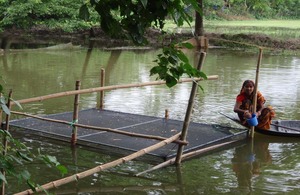DFID Research: World Water Day and the impacts of water cooperation
Friday the 22nd March is World Water Day. A new series of Outcome Stories, from the Challenge for Water and Food Programme, look at the socio-economic impacts of water efficiency.

Aquaculture in the Ganges, another area of CPWF research. Picture: CPWF
Friday the 22nd March is World Water Day. As part of the United Nations’ Water Cooperation 2013 Campaign, this day aims to raise awareness of the potential challenges for water cooperation and promote dialogue and innovation.
In developing countries, water for agriculture consumes 70 – 90% of water use. To meet the needs of a growing population, more food must be produced using less water. With increasing food insecurity in the developing world the balance of water and food is a delicate one.
The CGIAR Challenge Programme for Water and Food (CPWF) is an initiative, funded by DFID, which generates research led strategies around how to negotiate this balance. CPWF brings together research scientists, development specialists, and river basin communities in Africa, Asia and Latin America to create and disseminate international public goods (IPGs) that improve the productivity of water in river basins in ways that are pro-poor, gender equitable and environmentally sustainable.
It subscribes to a research driven approach structuring its projects around specific development challenges in clearly delineated areas. It uses ‘theory of change’ models to map likely pathways to stakeholder influence; ensuring that research is clearly linked to developmental outcomes.
As part of this approach the programme releases snapshots of ground level impact in its series of Outcome Stories. The documents provide insights into how CPWF research has fed into specific communities and track its influence across different areas.
The stories document the progress and outcomes of some of CPWF projects in target regions. They highlight how access to water and responsible water management are key components in developing successful strategies for improved nutrition, health and economic empowerment.
One story, Enhancing Water Productivity and Improving Livelihoods Through Drip Irrigation and Better Market Integration in Cambodia, documents the impact of integrating market-based strategies into agricultural water management in Cambodia. Referring to the increased demand for high value crops in Urban areas the report describes how the project designed a strategy to enable smallholders to establish links to markets for their products, while encouraging adoption of water and food technologies.
Introducing farmers to drip irrigation resulted in water savings, lower labor requirements and improved yields. Income of the target farmers more than doubled. The report illustrates how water efficiency was enhanced through a multi-faceted approach combining training in water usage and horticulture with market-led strategies.
Another story charts the influence of a programme conducted in the Ganges on gender mainstreaming in salt-affected areas. The project recognised that resource-poor families living in stress-prone rice environments in eastern Uttar Pradesh, India, rely heavily on female family members for rice production and processing operations.
Educating these women in the use of salt-tolerant varieties of rice and effective resource management improved their confidence and enhanced farmer participation throughout the area. By involving women in important decision-making processes the communities were able to benefit from an increase in human resources, while providing insights and practical knowledge which could be shared between farming communities.
While water and food remain at the root of all CPWF’s research, the recorded outcomes highlight the socio-economic impacts of effective water management. This series illustrates the dynamics of water cooperation in action and underlines the potential opportunities and impacts of water efficiency for the developing world.